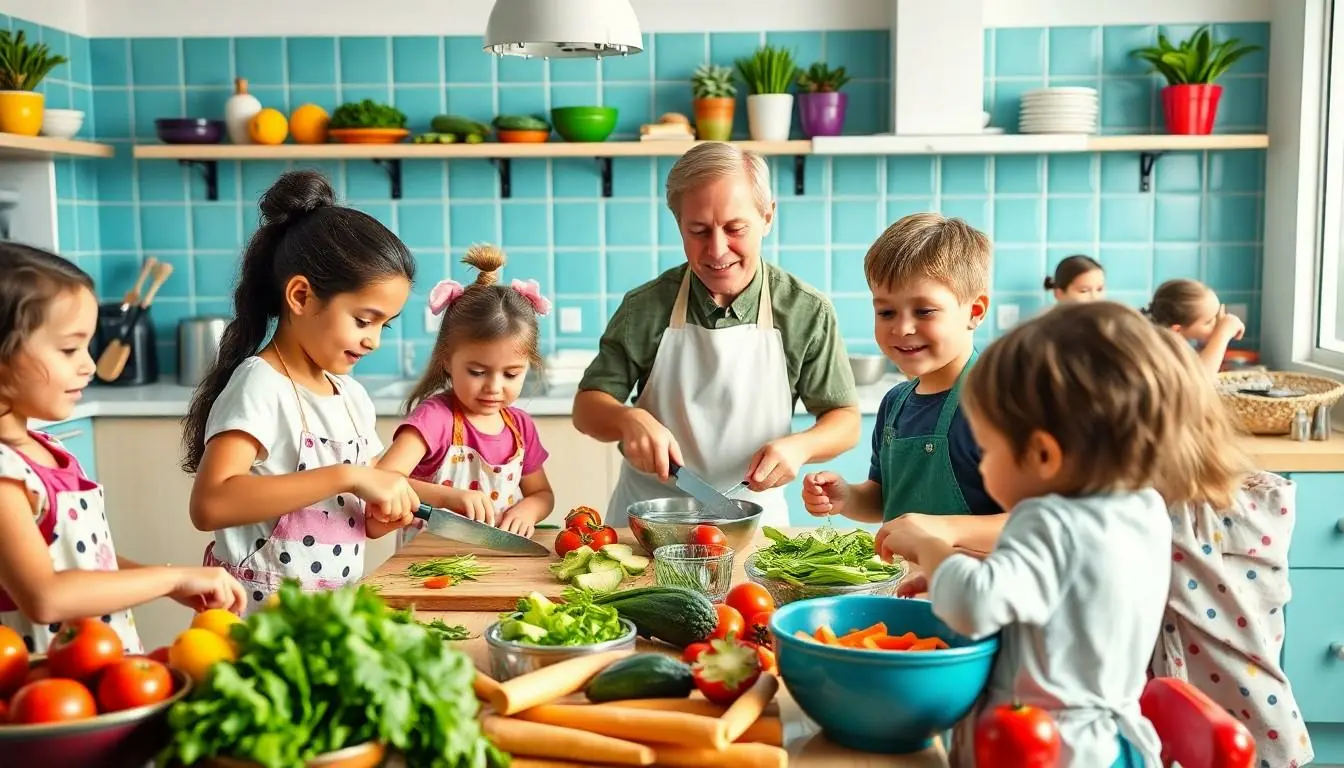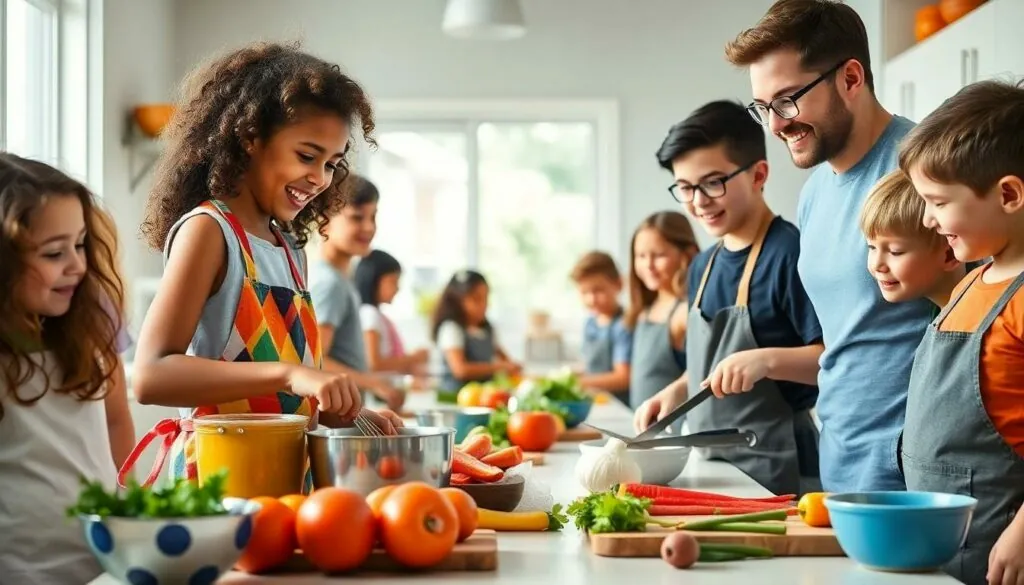Imagine a place where kids trade video games for veggie chopping and culinary creativity. Welcome to cooking camp, where little chefs whip up delicious dishes while learning essential kitchen skills. It’s not just about mixing flour and water; it’s about mixing fun and education in a way that keeps them coming back for more.
Table of Contents
ToggleOverview of Cooking Camp for Kids
Cooking camps for kids provide enriching experiences where children learn culinary skills in a fun environment. Young chefs participate in hands-on cooking activities, encouraging creativity and teamwork. Each camp typically focuses on a variety of cuisines, allowing children to explore flavors from different cultures.
Participants engage in lessons on kitchen safety, food preparation, and ingredient selection. These foundational skills promote confidence in the kitchen. Instructors usually emphasize the importance of following recipes, enabling kids to understand measurements and cooking techniques.
Most camps offer weekly sessions, accommodating different age groups. Daily schedules often include cooking classes, interactive games, and taste tests. Children develop friendships during these activities, creating a supportive community around the love of cooking.
Campers also experience the benefits of healthy eating. Nutrition education is often part of the curriculum, providing insight into balanced diets and meal planning. This holistic approach helps children appreciate the value of food and healthy choices.
Parental involvement is encouraged, with opportunities for family cooking nights showcasing what campers learn. These events strengthen family bonds while reinforcing the skills acquired during camp.
Cooking camps stand out as engaging environments promoting lifelong culinary skills, healthy habits, and lasting friendships. The blend of fun and education makes them a great choice for parents seeking extracurricular activities for their children.
Benefits of Cooking Camps

Cooking camps offer valuable learning experiences that shape healthy lifestyles and practical skills.
Promoting Healthy Eating Habits
Kids develop a deeper understanding of nutrition through engaging activities. Meals prepared at camp often include fresh ingredients, making healthy choices appealing. Exposure to various fruits, vegetables, and whole grains encourages participants to incorporate nutritious foods into their diets. Culinary instructors lead discussions about balanced meals, emphasizing the importance of nutrition. Children develop preferences for healthier options, which can last a lifetime. Friendships formed during the camp can foster a supportive community, motivating kids to share knowledge about healthy eating practices.
Enhancing Culinary Skills
Cooking camps provide hands-on experiences that enhance culinary skills. Participants learn essential techniques such as measuring ingredients, chopping vegetables, and following recipes accurately. Instructors guide kids through cooking various cuisines, broadening their taste horizons. Daily challenges help develop problem-solving abilities and creativity in the kitchen. Kids practice teamwork through group cooking projects, fostering collaboration and communication. Confidence grows as they successfully create delicious dishes, inspiring a passion for cooking. Overall, these skills promote independence and a sense of accomplishment that extends beyond the camp experience.
Types of Cooking Camps
Cooking camps come in various formats, catering to different preferences and schedules. Each type presents unique opportunities for children to explore culinary arts.
Day Camps
Day camps provide a fantastic option for kids who prefer returning home each evening. These camps typically run from morning to afternoon, allowing for engaging activities without overnight stays. Participants experience daily cooking classes that introduce them to diverse cuisines and techniques. Local chefs or culinary instructors often lead sessions, ensuring a hands-on approach. Activities may include interactive games and taste tests, perfect for fostering friendships. Children benefit from flexible schedules, participating in additional fun activities like field trips to local farms or markets. Day camps often accommodate different age groups, ensuring tailored activities suitable for each child’s abilities.
Overnight Camps
Overnight camps offer an immersive experience, allowing kids to fully engage in culinary adventures. Participants stay on-site for several days, encouraging deeper connections with peers and instructors. These camps usually feature comprehensive meal preparation, where children collaborate on larger group projects. Various culinary styles and advanced cooking techniques often receive emphasis, providing a more in-depth learning experience. The overnight format allows for themed nights, such as international cuisine nights, enhancing cultural exposure. Instructors often include nutrition education, imparting valuable lessons on healthy eating habits. The overnight setting fosters lasting friendships, creating memorable experiences that extend beyond cooking skills.
What to Expect at a Cooking Camp
Children experience an exciting mix of learning and fun at cooking camps. Engaging activities allow them to develop culinary skills while fostering new friendships.
Daily Schedule
Each day likely includes a structured timetable to balance cooking with fun. Morning sessions typically focus on hands-on cooking classes led by experienced chefs. Afternoon activities often involve interactive games related to food and ingredients. Taste-testing sessions may occur daily, letting kids sample their creations while sharing feedback with peers. Breaks provide opportunities for socializing and relaxation, ensuring that participants enjoy a well-rounded experience.
Types of Classes Offered
Cooking camps commonly feature diverse classes to cater to various interests. Basic cooking skills classes introduce children to essential techniques, fostering confidence. Ethnic cuisine classes explore flavors and dishes from different cultures, enhancing culinary knowledge. Specialty classes might focus on baking, dessert making, or healthy cooking, giving campers a chance to expand their skills further. Additionally, themed classes, like farm-to-table or seasonal cooking, provide hands-on learning while emphasizing sustainability and local ingredients.
Choosing the Right Cooking Camp
Selecting the right cooking camp involves understanding specific factors such as age appropriateness and skill level. Parents want their children to thrive in a suitable environment where learning and fun intersect.
Age Appropriateness
Age-appropriate camps cater to different developmental stages. Programs typically range from ages 5 to 17, ensuring activities match children’s maturity levels. Younger kids often engage in basic skills like measuring and mixing, while older campers tackle more complex recipes. Specific age groups promote peer interaction, enhancing the collaborative element of cooking. A camp that tailors its curriculum helps foster a comfortable learning environment.
Skill Level Considerations
Skill level plays a significant role in choosing a camp. Beginners benefit from lessons focused on foundational techniques like chopping and stirring. Intermediate campers explore advanced cooking methods and unique cuisines. Advanced sessions challenge seasoned young chefs with intricate dishes and culinary techniques. Each level offers hands-on learning, ensuring all campers feel successful. Camps that assess skill levels during enrollment can better match activities to individual needs.
Cooking camps offer children a unique opportunity to explore the culinary world while developing essential life skills. These camps not only teach kids how to cook but also encourage creativity teamwork and healthy eating habits. Through engaging activities and hands-on experiences kids build confidence and form lasting friendships.
With a variety of camp formats available parents can easily find the right fit for their child’s interests and skill level. Whether it’s a day camp or an overnight adventure the enriching environment of cooking camps promises memorable experiences that extend beyond the kitchen. Investing in a cooking camp can spark a lifelong passion for culinary arts and foster a deeper appreciation for nutrition and healthy living.




